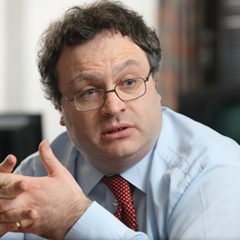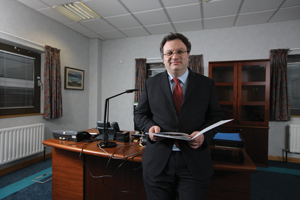 Skills are vital for economic success, emphasises Stephen Farry as he discusses his brief with Peter Cheney. The Employment and Learning Minister stands by his decision on tuition fees and wants to see more students gaining work experience.
Skills are vital for economic success, emphasises Stephen Farry as he discusses his brief with Peter Cheney. The Employment and Learning Minister stands by his decision on tuition fees and wants to see more students gaining work experience.
Stephen Farry sees his brief as a “huge opportunity” despite DEL being the last department handed out under d’Hondt. “It was very much something that was in our minds because we regarded DEL as being a major economic department,” the Alliance Party Minister comments, “and indeed a department that’s actually central to the long-term economic transformation of Northern Ireland, particularly through skills.”
Pressed on Alliance’s Assembly manifesto commitment to abolish DEL and merge it into a single economy department, he says there’s a “parallel discussion” on reforming government. However, he reiterates that as the system stands, Alliance saw DEL having a “central importance” to the economy.
“We never really regarded the tuition fees issue as being a reason not to choose DEL, which seemed to be the approach taken by some other parties,” Farry remarks. The 15-page section on skills in the Assembly manifesto confirms that choice.
His first responsibility is to ensure investment in the skills required for a “changing and growing” economy. He is admittedly entering office in a “very challenging time” with the economic downturn but also has his eye on how to “rebuild and rebalance” the economy, which he hopes will include the devolution of corporation tax.
Farry continues: “To all of that, skills are important, whether you’re talking about some of the more immediate problems in terms of basic employability skills … right through to discussing what are going to be the future skills needs of the economy in the context of an opportunity to get a lower rate of corporation tax, because that in itself will change the environment in which we’re operating.”
Fees
Of course, his most significant decision to date has been freezing tuition fees for local university students, subject to rises in line with inflation. There was a “considerable urgency” to take the decision. A consultation had been started by his UUP predecessor, Danny Kennedy, on 15 March and finished on 10 June. Farry and his officials “rapidly sat down after that” and put together an initial paper on the way forward for the Executive.
“To my mind, the issue of tuition fees, and what level they would be at, wasn’t actually my starting point,” he adds. “My starting point was about ensuring that we were properly funding our local universities and ensuring that they were internationally competitive because the future of our economy, particularly when we talk about a knowledge economy, depends upon investing in a number of key drivers.”
Skills and R&D are two of those main drivers. Higher education accounted for £161.8 million (or 31 per cent) of Northern Ireland’s R&D spend in 2010, up from £143 million in the previous year.
It was “critical” to maintain levels of investment in the two universities “and to do anything other than that would undermine our whole economic narrative”. Simply keeping fees to inflation, and therefore reducing the cash flow to universities, would mean people benefitting from a “cheaper education but getting a cheaper product”.
The final deal involved transferring funds from other departmental budgets (except health, education and justice) and £6 million from the Executive to create 540 new student places in STEM subjects.
While Alliance was politically flexible (opposing “unfair rises” in tuition fees rather than any rise), he notes: “It was clear going into the election and afterwards that there was a political consensus in Northern Ireland. We didn’t want to increase fees above the level of inflation.”
The budget he inherited assumed fees of £4,500 and the real debate was how to close that funding gap. Passing that on to the universities would have had “catastrophic consequences” for them and the economy.
It is put to him that Alliance’s real starting point is a commitment “in principle to abolishing tuition fees for Northern Ireland students, as in Scotland, at the earliest opportunity.” The apparently populist quote is contained in its 2010 general election manifesto, which could be interpreted as binding up to 2015.
Farry counters that “in an ideal world we wouldn’t have tuition fees” and claims that the reference covered a different financial context. “You also have to bear in mind that that was a manifesto for Westminster and decisions that we’re taking in Northern Ireland are in response to decisions that are being taking at a UK-wide level,” he states.
“Obviously if the UK Government had not gone down the line of a major increase in tuition fees, we would be in a much different context in Northern Ireland vis-à-vis what happens in the rest of the UK.”
The Minister is also a member of one of those governing parties, the Liberal Democrats. Alliance and the Lib Dems have a “very close relationship” but make decisions independently “so we are not beholden to their policies, and while we share a philosophy, we don’t always endorse the same policy direction.”
Alliance has for years called for Northern Ireland to become more outward-looking but it was willing to allow higher fees for students from Great Britain, which may deter migration. Those students will be charged £6,000 at the University of Ulster and £9,000 at Queen’s. He rejects the ‘deterrent’ argument, pointing out that the first priority under devolution was to make decisions according to local circumstances.
“If we didn’t take a decision to have a different fee level for GB students, we would have had a massive influx of students from GB coming here based on price rather than [the] quality of the institutions,” Farry states. This would have “potentially flooded the local market” and resulted in more Northern Ireland students moving across the Irish Sea “with the danger that we wouldn’t have got a critical mass of them back again.”
When a £4,500 limit for GB students is suggested, he questions the revenue that would be raised from that move. Farry also contends that those students are “not actually being asked to pay more to go to Northern Ireland” when they compare local universities with their competitors in Britain. He is also “very much open” to encouraging people to study in Northern Ireland.
Skills
On skills, the main priority is to match skills to what the economy needs today and in the future. He stresses the need for flexibility as “you can only anticipate so far” ahead.
The province has a mixed picture, with a considerable number of people either achieving high skill levels (though less than other competing regions) or having low levels of qualifications or none at all. Farry warns: “In that context, that is a missing opportunity because some people are not having the opportunity to develop to their full potential and your economy also suffers as a consequence from that.”
An updated strategy, entitled ‘Success through Skills – Transforming Futures’, was launched on 25 May but no implementation plan had been published by the time of interview in mid-November. Farry defends the gap, claiming that it was important to set the direction of travel “rather than having a vacuum” and he wanted the final plan to “tie together everything the department is doing”.
“There’s a lot happening in terms of higher education,” he continues, citing the fees decision, proposed increase in places and a forthcoming separate higher education strategy. “One thing you can’t criticise the department for is inaction. There’s been a lot of activity generated.”
The Minister therefore wants observers to judge his performance after his first year rather than his first six months. By May 2011, Farry expects to have a set of strategies covering skills, higher education, educational maintenance allowance and young people not in employment, education or training (the so-called NEETs).
In an implicit criticism of the UUP, he contrasts that “volume of product” with the output in previous years: “I’m not sure if it’s an issue of the Ulster Unionist Party or if it’s an issue of timing, I just know I inherited a lot of consultation documents that required decisions and then require strategies to be finalised.”
A higher education strategy is close to his heart given his academic background. Centrally, he wants local universities to remain internationally competitive and increase the teaching of STEM subjects. Degrees could be delivered more flexibly than the 3-4 year model, and he wants to encourage more work placements.
Funding is a “constant battle” and while he is pleased with his settlement in the Executive, Farry notes that universities in Great Britain will be able to raise additional funds through fees.
“The last thing I want to do is micro-manage the universities,” he says, “but equally, as an Executive and also as the department, we have a responsibility to ensure that public money is used towards public interest outcomes [i.e. upskilling and improving Northern Ireland’s research base] so we will have a natural dialogue with universities around the type of direction of travel we want to go down.”
Welfare reform, in his view, is one of the major challenges facing the entire Executive. Universal credit could incentivise some work for job seekers without a tax or benefits penalty.
DEL’s new work programme, to operate from April 2013, will focus on paying contractors by results. It will be hard to transplant that model from Great Britain but Northern Ireland’s coherent size is an opportunity. The real danger is that Northern Ireland recovers more slowly, thus limiting the number of new jobs for the unemployed.
Asked for his motivation as Minister, he replies: “It’s all about making a difference.” Farry concludes: “It’s not about getting office. It’s not about just getting elected. I mean, those are only a means to an end. It’s about taking the opportunity to apply your vision, your ideas, as to how things can be done differently and done better.”
Profile: Stephen Farry
Stephen Farry was first elected to the Assembly in 2007 and was a councillor for Abbey on North Down Borough Council from 1993 until 2011. He was previously Alliance’s General Secretary (2000-2007) and spoke on justice and finance in the Assembly’s last term.
Academically, Stephen studied politics at Queen’s University Belfast and obtained a PhD (also from Queen’s) on the United Nations in the post-Cold War era. He has also worked with two Washington-based think tanks: as a trainer for the National Democratic Institute in Croatia, Bosnia and Romania; and a senior fellow at the United States Institute of Peace. Married to Wendy, his interests are quizzes (having appeared on University Challenge in 1994), reading history and biography, and travel.







